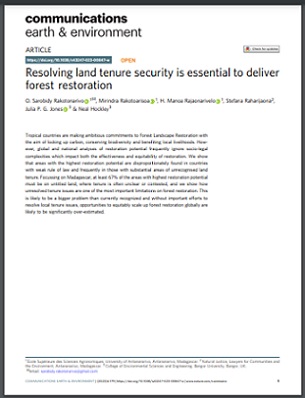
Tropical countries are making ambitious commitments to Forest Landscape Restoration with the aim of locking up carbon, conserving biodiversity and benefiting local livelihoods. However, global and national analyses of restoration potential frequently ignore socio-legal complexities which impact both the effectiveness and equitability of restoration. We show that areas with the highest restoration potential are disproportionately found in countries with weak rule of law and frequently in those with substantial areas of unrecognised land tenure. Focusing on Madagascar, at least 67% of the areas with highest restoration potential must be on untitled land, where tenure is often unclear or contested, and we show how unresolved tenure issues are one of the most important limitations on forest restoration. This is likely to be a bigger problem than currently recognized and without important efforts to resolve local tenure issues, opportunities to equitably scale up forest restoration globally are likely to be significantly over-estimated.














